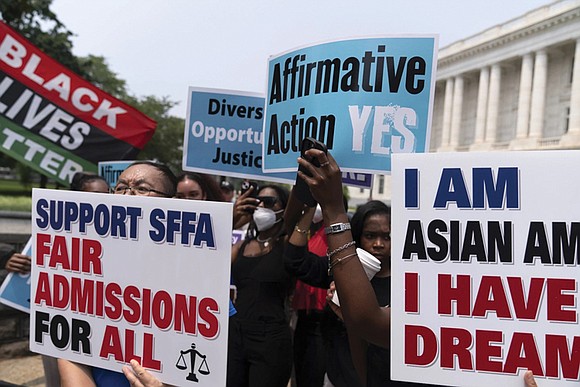Faith and fate of affirmative action
Cheryl Townsend Gilkes | 7/6/2023, 6 p.m.

It’s a different colorblindness than the one envisioned in Dr. Martin Luther King Jr.’s “I Have a Dream” speech.
The U.S. Supreme Court’s decision to reject the race-conscious admissions programs at Harvard University and the University of North Carolina comes in a year of 60th anniversaries in American civil rights history.
Dr. King’s letter from the Birmingham jail, the assassination of NAACP Field Secretary Medger Evers in Mississippi, the Detroit “Walk to Freedom” march organized by the Rev. C. L. Franklin and, tragically, the bombing of the 16th Street Baptist Church, also in Birmingham, all took place in 1963, as did the assassination of the pro-civil rights President John F. Kennedy.
But most indelibly perhaps, on Aug. 28 we will remember the speech Dr. King delivered at the March on Washington for Jobs and Freedom, popularly known as his “I Have a Dream” speech. Dr. King already had spoken of this dream on April 23 at the Detroit march, which until the March on Washington, was the largest civil rights march in U.S. history. In addition to featuring Dr. King, the Walk to Freedom also heard the voice of gospel singer Mahalia Jackson. Ms. Jackson, who sang and shared the stage at the March on Washington, is reported to have shouted to Dr. King during his speech, “Tell them about the dream!” And Dr. King did.
Conservative enemies of civil rights generally and affirmative action particularly have weaponized one image of that dream: “I have a dream that my four little children will one day live in a nation where they will not be judged by the color of their skin but by the content of their character.” Critics of the race conscious programs called affirmative action have used this one sentence to argue that Dr. King advocated for a colorblind society.
It is fascinating to listen to the various commentators defending the decision — from former Vice President Mike Pence to representatives of conservative think tanks — as they insist that affirmative action violates a similar colorblind vision contained in the Constitution. In the Court’s recent decision, they also cited the “equal protection” clause of the Constitution.
These pleas ignore 76 years of prodigious and violent defense of slavery between the framing of the Constitution in 1789 and the end of the Civil War in 1865. The colorblind world of affirmative action’s opponents also ignores the massive, state-by-state imposition of the system we called Jim Crow in the years between the framing of the 14th Amendment in 1866 (ratified in 1868) and Brown v. Board of Education in 1954, which spelled its end.
The states’ rights to require segregation was supported by Plessy v. Ferguson, an 1896 decision defended by stare de- cisis for 58 years. During that time most states, many of them now “red” states, were forced to come up with legal definitions of who was white and who was, in the language of the time, “colored.” The state that Mr. Pence once governed, Indiana, had a ban on Black in-migration, the largest population of Ku Klux Klan members, and a ban on interracial marriage.
One can only offer a theory of a colorblind past if one ignores this tragic history of racial injustice that is threaded through U.S. history. Justice Sonia Sotomayor called the six-justice majority’s position” a veneer of colorblindness in a society where race has always mattered and continues to matter in fact and in law.”
It’s difficult at this moment to hold onto our faith in Dr. King’s larger vision. The flurry of decisions at the end of this Court term illuminated the stark divisions in the United States over not only race but gender and sexuality. These decisions come as politicians in many states are engaged in an assault against what they call critical race theory, “wokeness” and LGBTQ+ communities. We are observing what journalist Wesley Lowery in his new book title calls “American Whitelash.”
Faith has a peculiar role in these culture wars. The court’s decision, handed down Friday, to uphold a Colorado web designer’s right to free speech was decided on precedents against forced affirmation, established to enable Jehovah’s Witnesses to resist pledging allegiance to the flag in public schools.
Meanwhile, on June 27, a court in Michigan ordered a prison to recognize the right of religious freedom of inmates to hold services under the banner of Christian Identity. Identified as a hate group by the Southern Poverty Law Center and as classical antisemites by the Anti-Defamation League, Christian Identity believes in segregation and that white people are the
appropriate children of Israel in the American promised land.
Faith communities have taken their own decisions to promote divisions, confusing progress with an insult to a divinely ordained order. It is perhaps no accident that the Supreme Court’s decisions coincide with the Southern Baptist Conven- tion’s decision to expel congregations with women in pastoral roles. This denomination, whose history is deeply rooted in the defense of slavery and in the defense of segregation, also became prominent among white evangelicals for branding critical race theory and intersectionality as unbiblical. Some evangelicals even used the term heresy.
As 2023 prompts us to remember civil rights triumphs and tragedies, the injustice of assaults on various forms of affirmative action and marginalized communities — and these assaults will continue — must remind us not to give in to despair and to continue the work until, in the words of the prophet Amos, we “let justice run down like water and righteousness like a mighty stream.”
Cheryl Townsend Gilkes is an assistant pastor for special projects at the Union Baptist Church in Cambridge, Mass., the John D. and Catherine T. MacArthur Professor Emerita of African American Studies and Sociology at Colby College, and a visiting distinguished professor at the Hartford International University for Religion and Peace.






